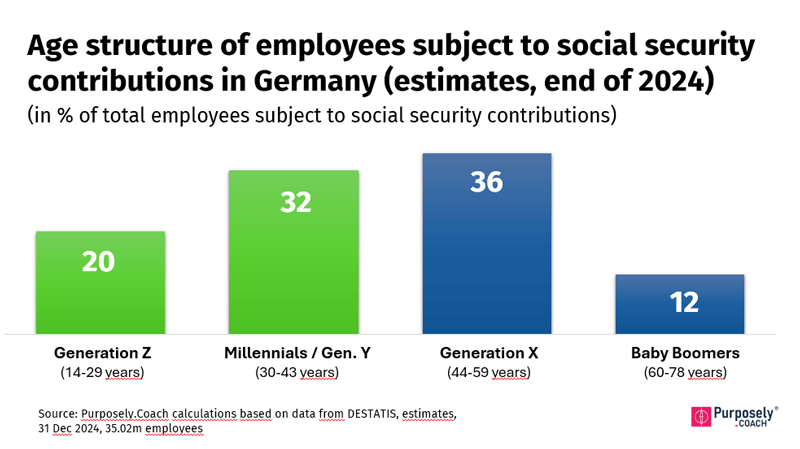More Balance, More Purpose: Cultural Change as an Opportunity for Business
von Andreas Paulicks, Founder Purposely.Coach
14 October 2025
What the younger generation is really telling us – and how companies can turn it into a culture of future strength.

The debate about a so-called generational conflict in the workplace is omnipresent. Headlines often pit "demanding" Millennials and Generation Z (born 1981–2012) against "traditional" Baby Boomers and Generation X (born before 1981). It seems like two worlds in opposition. Yet reality is far more nuanced – and points more to consensus than to conflict.
Different backgrounds, similar values
Younger generations demand workplaces that provide meaning, fair pay, and a focus on holistic well-being. Critics often dismiss these demands as excessive. But are they? Or do they simply reflect values shared by older generations, who in the past were less likely to articulate them openly?
Data suggests that values across generations differ less than stereotypes imply. According to Deloitte's Gen Z and Millennial Survey 2023, both younger and older employees highlight purpose, work-life integration, and a culture of trust as decisive for satisfaction and loyalty. Similarly, a McKinsey study (Gen What? Debunking age-based myths about worker preferences, 2023) shows that fundamental attitudes vary far less than commonly assumed. The narrative of a deep divide is misleading. What differs are the historical experiences that shape expectations.
Context shapes perspective
Millennials and Gen Z entered the workforce in employee-driven markets, confronted multiple crises – financial downturns, pandemic, geopolitical instability – and grew up with digital tools as a natural extension of work. They are more confident, vocal, and willing to challenge established routines.
By contrast, many Gen X and Baby Boomers were socialized in times of long-term employment, clearer career paths, and stronger employer loyalty. These contrasts may create friction, yet they follow a familiar pattern: every new generation arrives with fresh tools, new conditions, and perspectives that question the status quo.
A demographic turning point
The simultaneous rise of digital-native generations and the mass retirement of Baby Boomers represents not a cyclical shift, but a structural transformation. Soon, Millennials and Gen Z will form the dominant majority of the workforce, with their influence growing year by year. They will be required to take on responsibility quickly, under the immense pressure of rapid technological and ecological change.
This makes one point clear: the future viability of organizations depends on taking the expectations of younger employees seriously and integrating them productively into business development. Re-education, denial, or lip service will not work. Companies that ignore this cultural shift risk losing the very talent they depend on.

A key driver: authentic purpose
At the heart of this transition lies purpose. Research shows that purpose not only drives motivation and loyalty but also reduces turnover – and has become a decisive criterion in job choices (McKinsey, 2021: Help your employees find purpose – or watch them leave). Purpose, however, must be more than a slogan. It must be authentically defined, clearly communicated, and embedded into everyday work. Only when employees perceive meaning in their own contribution does purpose foster real commitment.
Purpose is most powerful when combined with a culture of trust, transparency, flexibility, and genuine investment in employee well-being. Navigating this generational shift successfully will be one of the most critical economic challenges – and strategic opportunities – of the decade.
The essence
The "generational conflict" is less a clash of values than a difference in formative experiences. Data points to consensus: meaning, fairness, and well-being are universal needs. The younger generation simply articulates them more clearly – and, given their demographic weight, they now set the tone.
Organizations that embrace this reality will create resilient, multi-generational cultures. Not as a reaction to short-term trends, but as a long-term strategic investment in loyalty, motivation, and innovation. Purpose becomes the connective tissue that binds employees to their work and their company – securing the future strength of the organization.
References: - Help your employees find purpose—or watch them leave (McKinsey, 2021) - Deloitte. 2025 Gen Z and Millennial Survey - Gen what? Debunking age-based myths about worker preferences (McKinsey, 2023)
(c) 2025 Purposely.Coach®. Dieser Artikel ist urheberrechtlich geschützt.
Teilen und Weitergeben in sozialen Netzwerken ist ausdrücklich erwünscht – bitte immer mit Angabe der Quelle und einem Link auf den Originalbeitrag. Jede weitere Nutzung (z. B. Abdruck, kommerzielle Verwendung) erfordert unsere vorherige Zustimmung.
